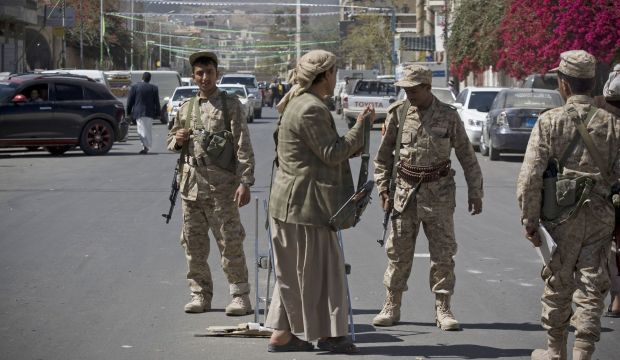
Houthi fighters wearing army uniforms stand guard on a street leading to the presidential palace in Sana’a, Yemen, on January 21, 2015. (AP Photo/Hani Mohammed)
Sana’a, Reuters/Asharq Al-Awsat—Yemen’s Houthi fighters took up guard at President Abd Rabbuh Mansur Hadi’s home on Wednesday but said they had not toppled him, after two days of fighting that have put the Shi’ite group in all but total control of the capital.
The Houthis, who are friendly to Iran, have emerged as the dominant force in the country but, for now at least, appear to have decided to stop short of overthrowing Hadi.
Their defeat of the presidential guards in gunbattles and artillery duels in recent days adds to disarray in a country where the United States is also carrying out drone strikes against one of the most powerful branches of Al-Qaeda.
After clashes at the president’s office and home on Tuesday, the Houthis’ leader threatened in a speech overnight to take further “measures” unless Hadi bows to his demand for constitutional changes that would increase Houthi power.
By early morning on Wednesday, Houthi fighters, accompanied by an armored vehicle, had replaced the guards at the president’s residence. Presidential guard sentry posts were initially empty, however a few guards later appeared and were permitted to take up positions.
“President Hadi is still in his home. There is no problem, he can leave,” Mohammed Al-Bukhaiti, a member of the Houthi politburo, told Reuters.
A senior government official told Asharq Al-Awsat that Hadi would continue to work, though others expressed fears that the situation could escalate further.
Yemeni presidential advisor Faris Al-Saqqaf said Hadi will not surrender as long as he is in a strong position and will resign only when he feels incapable of holding power.
Yemen’s Foreign Minister Abdullah Al-Saidi—who is on an emergency visit to Riyadh to discuss the situation in Yemen—said the future of his country is becoming increasingly uncertain as the situation worsens.
Yemeni government spokesman Rajih Badi said that his country will face a scenario similar to that of Libya if the UN-sponsored power-sharing deal is not implemented.
For his part, Yemen’s former ambassador to the Arab League, Abdul-Wali Al-Shameri, lashed out at Hadi, blaming him for the chaos in Yemen.
“Without his wrongful policy, Houthi insurgents would not go beyond [their northern stronghold of] Sa’ada,” said Shameri who quit after the 2011 public uprising against former President Ali Abdullah Saleh.
The former diplomat said Hadi has failed to cooperate with senior military officials in Yemen, relying instead on instructions from the US ambassador in Sana’a.
Yemen, an impoverished nation of 25 million, has been plagued by Islamist insurgency, separatist conflict, sectarian strife and economic crisis for years. An “Arab Spring” popular uprising in 2011 led to the downfall of long-ruling President Ali Abdullah Saleh, bringing more chaos.
The Houthis, rebels from the north drawn from a large Shi’ite minority that ruled a 1,000-year kingdom in Yemen until 1962, stormed into the capital in September but had held back from directly challenging Hadi until this week.
Houthi fighters battled guards at Hadi’s home and entered the presidential palace on Tuesday. In his televised speech overnight, Houthi leader Abdul Malik Al-Houthi warned Hadi that he had to implement a power-sharing deal struck when his men seized the capital in September.
“We . . . will not hesitate to impose any necessary measures to implement the peace and partnership agreement,” said Abdil Malik, whose Shi’ite Muslim group is widely seen as an ally of Iran in its regional struggle for influence with Saudi Arabia.
“All the options are open and without exception and the ceiling is very, very high. And this is why, I here advise the president . . . Implement this deal. It is for your benefit and for the benefit of your people,” he said on live television.
The accord gives the Shi’ite Muslim group, which takes its name from the family of its leader, a role in all military and civil state bodies. Hadi, an ally of the West and staunch supporter of US drone attacks on Al-Qaeda fighters in Yemen, has also been at odds with the Houthis over the divisions of regional power in a draft constitution.
Abdul Malik’s speech appeared to leave little doubt that his movement was now in effective control of the country. Al Masdar newspaper referred to him as “the president’s president.”
The emergence of the Houthis as Yemen’s de facto top power in September has scrambled alliances and across Yemen’s political spectrum, raising fears of deeper instability in a country that shares a long border with the world’s top oil exporter, Saudi and Arabia, and which also has one of al Qaeda’s most active branches.
Foreign ministers of Gulf Arab states, allies of Hadi, were due to discuss the crisis in Yemen at an emergency meeting in the Saudi capital Riyadh later on Wednesday.
Yemeni Information Minister Nadia Al-Saqqaf said on Tuesday that clashes at Hadi’s residence amounted to an attempt to topple Yemen’s government, which the Houthis denied.
